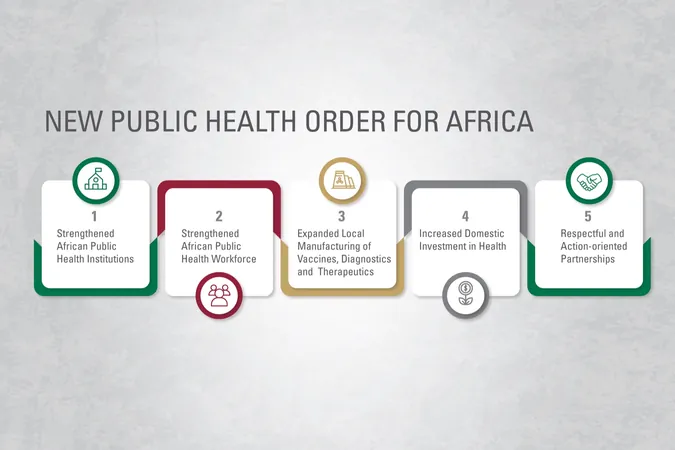
Africa Reforms Public Health to Face Urgent Challenges: Insights from the Pan African Parliament
2024-10-11
Author: Li
Introduction
In a significant milestone for the continent, the 12th Annual Conference of Speakers of National and Regional Parliaments, hosted by the Pan African Parliament (PAP) in Midrand, South Africa, spotlighted pressing issues affecting Africa today. Discussions ranged from devastating environmental challenges like floods and climate change to pressing health concerns, including the rise of Mpox, Non-Communicable Diseases, food security, regional cooperation, and strategies for peacebuilding.
New Public Health Order
On September 18, 2024, Dr. Jean Kaseya, the Director General of Africa CDC, presented a vision for a safer and healthier Africa, advocating for a transformative "New Public Health Order." This vision, articulated through Dr. Lul Riek, the Regional Director for the Southern Africa Regional Coordinating Center, underlines the urgent need for Africa to take control of its health security systems, especially highlighted by the COVID-19 pandemic and recent Mpox outbreaks.
Dr. Kaseya emphasized that existing global health policies have repeatedly fallen short in addressing Africa's specific health needs. He indicated a pressing requirement for a fundamental shift in how public health is approached on the continent, stressing the importance of local leadership, innovation, and investment in health infrastructures. The New Public Health Order will enable Africa to create robust health systems capable of withstanding crises before they arise and maintaining resilience during and after these challenges.
Key Components of the Initiative
Central to this initiative are five key components: community health, digital connectivity through health tools, capacity-building, collaborative efforts, and addressing climate impacts on health. Dr. Kaseya envisions enhanced National Public Health and Research Institutes collaborating with local universities to provide expertise in managing health emergencies and advancing genomic sequencing abilities. These improvements are expected to lead to robust local manufacturing processes for essential health products, including vaccines and therapeutics, entirely produced on the continent.
Domestic Health Financing
The call for increased domestic health financing echoes earlier declarations, including the Abuja Declaration of 2001 and the African Leadership Meeting's promises from February 2019, advocating that African nations allocate 15% of their budgets to health. Furthermore, the establishment of the Africa Epidemics Fund announced in February 2022 is set to bolster these financial strategies and expedite the implementation of the New Public Health Order.
Strengthening the Public Health Workforce
Significantly, the plan also focuses on strengthening the public health workforce through expanded training for field epidemiologists and community health workers, alongside leadership programs established such as the Kofi Annan Fellowship in Public Health Leadership, launched on May 25, 2020.
Disparities in Public Health Institutions
Dr. Kaseya pointed out the disparities that still exist within the Member States' public health institutions, noting that while 23 countries have established National Public Health Institutes, many remain under-resourced and not fully operational. This lack of readiness is evident, as only 5% of Africa's laboratories meet international diagnostics standards and the continent remains reliant on imported health solutions—producing a mere 1% of vaccines and 30-40% of therapeutics locally.
Urgency in Addressing Mpox Cases
Amidst a surge in Mpox cases, the urgency for enhanced surveillance systems, laboratory capacity, community engagement, and vaccine access has never been higher. Coordination among Africa CDC, WHO, and other partners has facilitated a unified response approach to health emergencies, uniting planning efforts for greater efficacy.
Africa CDC's Role and Call to Action
The Africa CDC is actively working to identify and implement effective Mpox testing solutions, supported by the provision of essential equipment and supplies to countries including Burundi and the Central African Republic. Dr. Kaseya has called upon members of the Pan African Parliament and all relevant stakeholders to bolster initiatives focused on surveillance, public awareness, and vaccination drives against Mpox, as countries strive to confront these significant health challenges.
Conclusion
This pivotal conference marks a renewed commitment from African leaders to reshape the continent's health landscape, paving the way for a self-reliant and resilient public health framework that could forever change the narrative on health crises in Africa. The implications of such reforms could resonate not just within the continent, but also influence global health strategies in partnership with Africa.
Stay tuned for updates as Africa—including its citizens and leaders—rallies together to redefine its public health future!


 Brasil (PT)
Brasil (PT)
 Canada (EN)
Canada (EN)
 Chile (ES)
Chile (ES)
 España (ES)
España (ES)
 France (FR)
France (FR)
 Hong Kong (EN)
Hong Kong (EN)
 Italia (IT)
Italia (IT)
 日本 (JA)
日本 (JA)
 Magyarország (HU)
Magyarország (HU)
 Norge (NO)
Norge (NO)
 Polska (PL)
Polska (PL)
 Schweiz (DE)
Schweiz (DE)
 Singapore (EN)
Singapore (EN)
 Sverige (SV)
Sverige (SV)
 Suomi (FI)
Suomi (FI)
 Türkiye (TR)
Türkiye (TR)